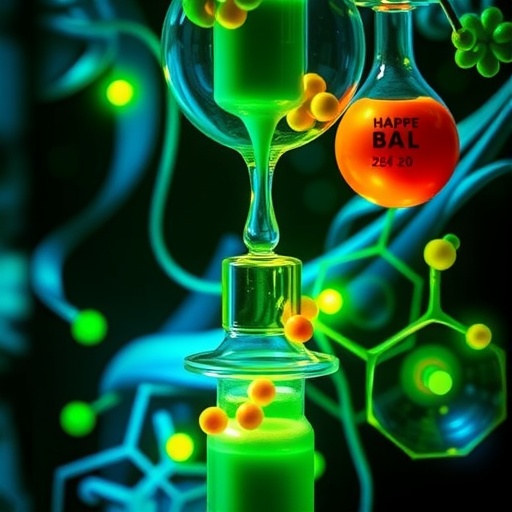In a groundbreaking advancement in sustainable biotechnology, researchers at The Ohio State University have unveiled a novel electro-fermentation process that significantly accelerates the bioconversion of industrial food waste into valuable chemical precursors. This innovative approach not only shortens the fermentation timeline but also amplifies the yield of early platform chemicals — essential building blocks for a wide array of industrial products — all while simultaneously generating clean energy in the form of hydrogen gas.
Traditional fermentation techniques rely on naturally occurring microbial metabolism to break down waste materials, a method that, although effective, often suffers from slow reaction rates and limited control over the chemical spectrum produced. The Ohio State team’s cutting-edge process introduces an applied electrical current within the fermentation bioreactor, creating an electrochemical environment that stimulates microbial activity and metabolic pathways to enhance productivity. This electrified microbial fermentation, or electro-fermentation, harnesses minimal external voltage to proffer an efficient metabolic “jolt,” optimizing biochemical conversions at room temperature without the need for extensive heating.
Central to this breakthrough is the hybridization of microbial communities in the bioreactor, wherein two distinct species of the genus Clostridium, namely C. bijerinckii and C. carboxidivorans, are co-cultured. This strategic pairing leverages a synergistic microbial interplay: while C. bijerinckii processes organic substrates generating alcohols and expels carbon dioxide as a byproduct, C. carboxidivorans consumes the emitted carbon dioxide and concurrently produces additional solvents and hydrogen gas. This cooperative metabolism not only enhances targeted chemical output but also concurrently reduces greenhouse gas emissions during the process.
The research employed challenging feedstocks representative of industrial food waste, initially using dairy-based substrates such as ice cream and sour cream. The team’s methodology was rigorously tested by comparing conventional anaerobic fermentation — conducted at human body temperature (approximately 98.6°F) — with the electro-fermentation approach operated at standard room conditions within electrode-equipped bioreactors. Intriguingly, the latter demonstrated not only accelerated metabolic rates but also superior yields of multipurpose chemicals, underscoring the potential for scalable industrial adoption.
This electrified bioprocess resonates with growing global imperatives to valorize waste streams, diverting material from conventional disposal routes such as landfills or incineration, both notable contributors to environmental pollution and climate change. By enabling conversion of organic waste that would otherwise generate methane — a potent greenhouse gas — into commercially viable chemicals and clean fuel, this technology could redefine waste management paradigms and circular economy models.
Beyond its environmental significance, the team emphasises the economic implications: industrial sectors often pay contractors for waste removal; converting these liabilities into revenue-generating resources offers a compelling value proposition. The ease of integrating a compact bioreactor system onsite for continuous valorization transforms waste management from a cost center into a profit center, an attractive paradigm for food processors and agricultural enterprises alike.
A salient feature of this work involves the intricate electrochemical interactions within the bioreactor, where electrodes supply minimal voltage that modulates the redox potential of the microbial environment. This “tingling electricity,” as described by lead researcher Beenish Saba, effectively induces a metabolic stress response that upregulates microbial enzyme activities, thereby accelerating substrate conversion rates and shifting metabolic fluxes towards desirable chemical outputs. The process also reduces fermentation timeframes, improving operational throughput for industrial biomanufacturing setups.
Moreover, the dual-species co-culture cultivates a metabolic network in which the waste carbon dioxide is not simply emitted but recycled within the microbial consortium, improving carbon efficiency. This in situ carbon recycling not only mitigates emissions but simultaneously facilitates the sustainable generation of hydrogen gas — a versatile clean energy vector with applications ranging from fuel cells to chemical synthesis.
This novel electro-fermentation platform builds upon an extensive foundation of prior waste valorization efforts at The Ohio State University, where comprehensive physicochemical profiling of numerous food waste types laid the groundwork for identifying optimal substrates for microbial bioconversion. By systematically linking substrate characteristics to fermentation performance, the researchers have designed a finely tuned system adaptable to a wide array of organic residues, including recalcitrant materials like coffee grounds and lake algae.
Looking forward, the research delineates clear avenues for optimization and scale-up. Key goals include refining microbial consortia composition to further enhance selectivity of chemical production, optimizing electrode materials and configurations to maximize electrical efficiency, and integrating process controls for consistent product quality. The team is actively working to establish pilot-scale demonstrations that bridge laboratory success to commercial viability, signaling promising prospects for translating this technology into the industrial biotechnology arena.
From a policy and market standpoint, this research aligns with governmental priorities emphasizing sustainable technology development and circular bioeconomy initiatives. By addressing pressing challenges such as waste overproduction, greenhouse gas mitigation, and renewable chemical manufacturing, electro-fermentation stands poised as a transformative platform that meets environmental, economic, and energy sustainability objectives with synergistic benefits.
In summary, the Ohio State researchers have charted an exciting course to convert problematic industrial food wastes into valuable, multi-functional platform chemicals through an innovative electro-fermentation method, powered by microbial synergy and electrical stimulation. Their work exemplifies how harnessing microbial electrochemistry opens new frontiers in green biomanufacturing, driving progress toward a sustainable and resource-efficient future.
—
Subject of Research: Biomanufacturing platform chemicals from industrial food waste via electro-fermentation using mono- and co-cultures of Clostridium species
Article Title: Biomanufacturing of early platform chemicals from industrial processing food waste using mono- and co-culture electrofermentation
Web References:
Journal of Environmental Chemical Engineering article
DOI: 10.1016/j.jece.2025.117732
Keywords
Electro-fermentation, food waste valorization, Clostridium co-culture, hydrogen gas production, microbial electrochemical system, sustainable biomanufacturing, platform chemicals, circular bioeconomy, green technology, bioenergy, waste-to-chemicals, industrial biotechnology
Tags: bioconversion of industrial wastechemical production from food wasteClostridium co-cultureefficient fermentation techniqueselectro-fermentation technologyfood waste fermentation processhybrid microbial communitieshydrogen gas generationmicrobial metabolism enhancementoptimizing biochemical conversionsrenewable energy from wastesustainable biotechnology





